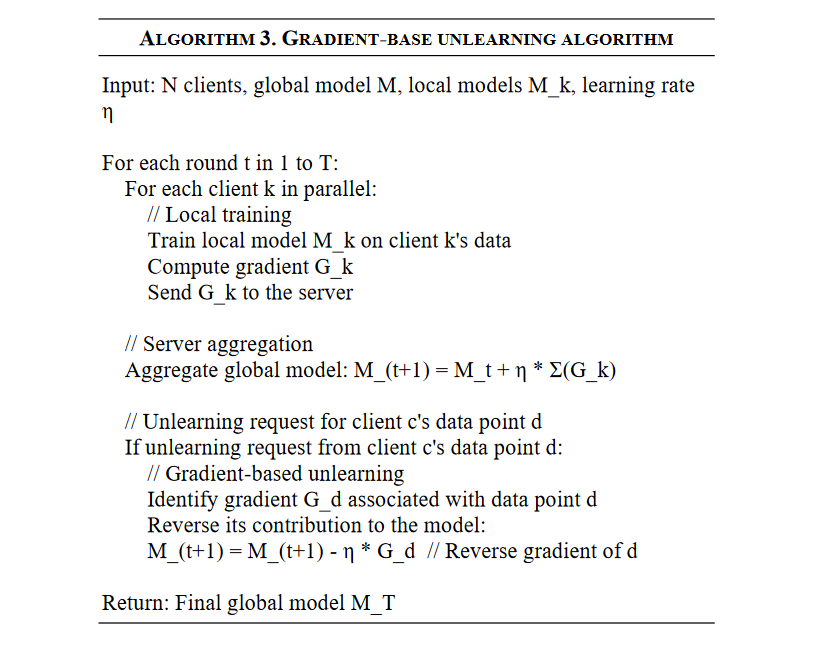When Federated Learning Meets Machine Unlearning
DOI:
https://doi.org/10.5281/zenodo.13854241ARK:
https://n2t.net/ark:/40704/JIEAS.v2n5a07References:
26Keywords:
Heterogeneous Machine Learning, Federated Learning, Machine Unlearning, Graph Neural Network, Gradient-based Learning, Elastic Weight ConsolidationAbstract
This research paper explores the intersection of Incremental Learning and Unlearning in the context of machine learning, with a particular emphasis on dynamic environments where data evolves rapidly, and models must continuously adapt. Incremental learning allows machine learning models to efficiently update their knowledge without retraining from scratch, while incremental unlearning ensures compliance with privacy regulations or user requests by selectively removing specific data points from the model. The paper discusses several key techniques for balancing learning and unlearning, including Elastic Weight Consolidation (EWC), gradient-based unlearning, fine-tuning, and memory-based methods.
Downloads
Metrics
References
Z. Wu, "MPGAAN: Effective and Efficient Heterogeneous Information Network Classification," Journal of Computer Science and Technology Studies, vol. 6, p. 08–16, 2024.
Z. Wu, "Deep Learning with Improved Metaheuristic Optimization for Traffic Flow Prediction," Journal of Computer Science and Technology Studies, vol. 6, p. 47–53, 2024.
Z. Wang, Y. Chen, F. Wang and Q. Bao, Improved Unet model for brain tumor image segmentation based on ASPP-coordinate attention mechanism, 2024.
X. Liu and Z. Wang, "Deep learning in medical image classification from mri-based brain tumor images," arXiv preprint arXiv:2408.00636, 2024.
X. Liu, H. Qiu, M. Li, Z. Yu, Y. Yang and Y. Yan, "Application of Multimodal Fusion Deep Learning Model in Disease Recognition," arXiv preprint arXiv:2406.18546, 2024.
X. Liu, Z. Yu and L. Tan, "Deep Learning for Lung Disease Classification Using Transfer Learning and a Customized CNN Architecture with Attention," arXiv preprint arXiv:2408.13180, 2024.
X. Liu, Z. Yu, L. Tan, Y. Yan and G. Shi, "Enhancing Skin Lesion Diagnosis with Ensemble Learning," arXiv preprint arXiv:2409.04381, 2024.
Z. Wang, Y. Zhu, Z. Li, Z. Wang, H. Qin and X. Liu, "Graph neural network recommendation system for football formation," Applied Science and Biotechnology Journal for Advanced Research, vol. 3, p. 33–39, 2024.
Z. Li, B. Wang and Y. Chen, "Incorporating economic indicators and market sentiment effect into US Treasury bond yield prediction with machine learning," Journal of Infrastructure, Policy and Development, vol. 8, p. 7671, 2024.
M. Sun, Z. Feng, Z. Li, W. Gu and X. Gu, "Enhancing financial risk management through lstm and extreme value theory: A high-frequency trading volume approach," Journal of Computer Technology and Software, vol. 3, 2024.
K. Xu, Y. Wu, Z. Li, R. Zhang and Z. Feng, "Investigating financial risk behavior prediction using deep learning and big data," International Journal of Innovative Research in Engineering and Management, vol. 11, p. 77–81, 2024.
Q. Yang, Y. Liu, T. Chen and Y. Tong, "Federated machine learning: Concept and applications," ACM Transactions on Intelligent Systems and Technology (TIST), vol. 10, p. 1–19, 2019.
K. Bonawitz, "Towards federated learning at scale: Syste m design," arXiv preprint arXiv:1902.01046, 2019.
B. McMahan, E. Moore, D. Ramage, S. Hampson and B. A. y Arcas, "Communication-efficient learning of deep networks from decentralized data," in Artificial intelligence and statistics, 2017.
Y. Cao, A. F. Yu, A. Aday, E. Stahl, J. Merwine and J. Yang, "Efficient repair of polluted machine learning systems via causal unlearning," in Proceedings of the 2018 on Asia conference on computer and communications security, 2018.
L. Bourtoule, V. Chandrasekaran, C. A. Choquette-Choo, H. Jia, A. Travers, B. Zhang, D. Lie and N. Papernot, "Machine unlearning," in 2021 IEEE Symposium on Security and Privacy (SP), 2021.
S. Schelter, "amnesia–towards machine learning models that can forget user data very fast," in 1st International Workshop on Applied AI for Database Systems and Applications (AIDB19), 2019.
Y. Tao, "Meta Learning Enabled Adversarial Defense," in 2023 IEEE International Conference on Sensors, Electronics and Computer Engineering (ICSECE), 2023.
L. Tan, S. Liu, J. Gao, X. Liu, L. Chu and H. Jiang, "Enhanced self-checkout system for retail based on improved YOLOv10," arXiv preprint arXiv:2407.21308, 2024.
Y. Tao, "SQBA: sequential query-based attack," in Fifth International Conference on Artificial Intelligence and Computer Science (AICS 2023), 2017.
Y. Tao, Y. Jia, N. Wang and H. Wang, "The FacT: Taming Latent Factor Models for Explainability with Factorization Trees," in Proceedings of the 42nd International ACM SIGIR Conference on Research and Development in Information Retrieval, New York, NY, USA, 2019.
Y. Tao, Z. Wang, H. Zhang and L. Wang, "NEVLP: Noise-Robust Framework for Efficient Vision-Language Pre-training," arXiv preprint arXiv:2409.09582, 2024.
C. Wu, S. Zhu and P. Mitra, "Federated unlearning with knowledge distillation," arXiv preprint arXiv:2201.09441, 2022.
T. Shaik, X. Tao, H. Xie, L. Li, X. Zhu and Q. Li, "Exploring the landscape of machine unlearning: A comprehensive survey and taxonomy," arXiv preprint arXiv:2305.06360, 2023.
X. Zhu, G. Li and W. Hu, "Heterogeneous federated knowledge graph embedding learning and unlearning," in Proceedings of the ACM web conference 2023, 2023.
Y. Li, X. Lyu, N. Koren, L. Lyu, B. Li and X. Ma, "Neural attention distillation: Erasing backdoor triggers from deep neural networks," arXiv preprint arXiv:2101.05930, 2021.

Downloads
Published
How to Cite
Issue
Section
ARK
License
Copyright (c) 2024 The author retains copyright and grants the journal the right of first publication.

This work is licensed under a Creative Commons Attribution 4.0 International License.
















